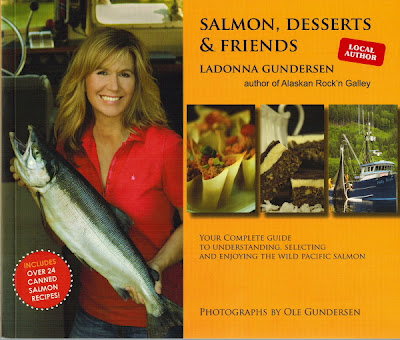This was the first cookbook I bought at our first port-of-call in Alaska, where I traveled with my daughter Kristina this past June on a week-long cruise beginning in Seattle. We arrived in the beautiful little town of Ketchikan early in the morning. We were hungry for breakfast and found a quaint cafe called “Sweet Mermaids.” I sat down at one of the tables and directly across from me was a display of this cookbook from a local author, with every one of them signed “Best Fishes!”
Author LaDonna Gunderson was a California girl on an adventurous fishing trip over twenty years ago on a chilly September day. One of the crew, Ole Gunderson, caught her eye while he caught the salmon. They later married and moved to Ketchikan where they own their own fishing business gillnetting for salmon, pot fishing for shrimp, and long lining for halibut.
Being that Ketchikan is known as “The Salmon Capital of the World,” it is no surprise that LaDonna decided to write a salmon cookbook. Her goal in writing the book was to celebrate the extraordinary wild Pacific salmon. Near the beginning of the book in big bold red letters are the words: “Friends Don’t Let Friends Eat Farmed Salmon.” I couldn’t agree more. There is nothing like wild caught salmon. There are no fish farms in Alaska, where the law prohibits all types of fish farming. The salmon swim wild in icy, clear, and unspoiled waters of the North Pacific. They feed on the sea’s natural marine life, unlike farm raised which are fed a diet of industrially manufactured feed. There is a compelling taste and texture difference of wild caught salmon. Alaskan salmon and other seafood is additive-free and provided healthful natural nutrients such as omega-3 fatty acids which are vital for brain function, healthy skin and hair, and a well-tuned cardiovascular and nervous system.
Salmon are anadromous, meaning, they are born in fresh water, migrate to the ocean to grow into adults and then return to fresh water to spawn. The Alaskan salmons include, pink, sockeye, chum, coho, and chinook, or king salmon. The book easily explains how to select the right fish by viewing, smelling and touching, along with all the methods of how to cook it, be it grilling, broiling, baking, or sauteing. There are recipes for breakfast dishes such as herbed crepes with smoked salmon and lemon zest; a fluffy salmon omelette; quiches, stratas, and frittatas. Lunches include chowders and soups such as a hearty corn, salmon, and potato chowder, and a mushroom, salmon, and wild rice soup. There is a salmon burger with a creamy basil sauce, a smoked salmon club, or the intriguing cranberry-almond salmon sandwich. Appetizers include quiches, dips, spring rolls, croquettes, bruschetta, and kabobs. The main dishes shine with salmon loaf, salmon cakes, casseroles, pasta dishes, seared salmon with a blueberry salsa, teriyaki salmon with shittake mushrooms and fresh chives, and a roasted salmon with bok choy and coconut rice. There is a “Galley Treats” section with such delectable offerings as a banana cream pie in a peanut butter cookie crust, the ever-popular Nanaimo bars, and a chocolate baked Alaska. This is indeed a wonderful cookbook.
I’ll leave you with a few of the salty superstitions of fisherman. Even though there are not pirates as there were in the old days, the superstitions still abound. In the past, the job was a dangerous one and the slightest mistake could spell disaster. To deter any type of dangerous action and behavior, superstitions served as warnings and therefore minimize future calamities. Part of the romance of the sea is found in its traditions and none have lingered longer than the superstitions of sailors and fishermen:
For sailors it was lucky to:
-break a bottle of wine or champagne against the hull of a new ship
-step aboard using the right foot to start the journey “on the right foot”
-throw coins into the sea as a boat leaves port for a safe voyage
-have charms aboard such as fox tails, seal skins, shark teeth, and sea shells
For sailors it was unlucky to:
-begin a voyage on a Friday
-to carry black bags
-to whistle
-to look back once the ship has set sail
-to throw a stone over the departing vessel












No comments yet.